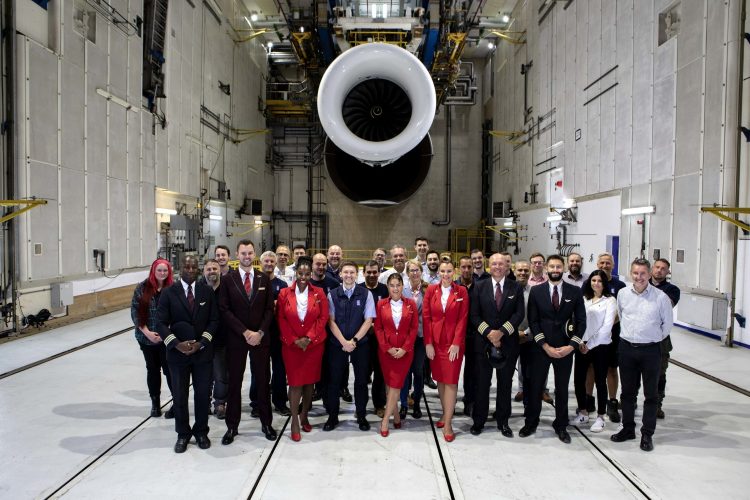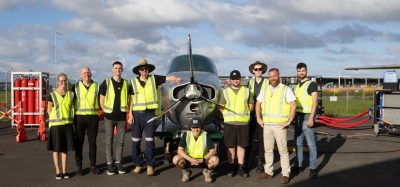World’s first 100% SAF transatlantic flight prepares take off
- Like
- Digg
- Del
- Tumblr
- VKontakte
- Buffer
- Love This
- Odnoklassniki
- Meneame
- Blogger
- Amazon
- Yahoo Mail
- Gmail
- AOL
- Newsvine
- HackerNews
- Evernote
- MySpace
- Mail.ru
- Viadeo
- Line
- Comments
- Yummly
- SMS
- Viber
- Telegram
- Subscribe
- Skype
- Facebook Messenger
- Kakao
- LiveJournal
- Yammer
- Edgar
- Fintel
- Mix
- Instapaper
- Copy Link
Posted: 21 July 2023 | International Airport Review | No comments yet
Virgin Atlantic and Rolls-Royce confirmed a blend ground test which will see the world’s first 100% SAF flight travel across the Atlantic.


Virgin Atlantic will fly the world’s first 100% Sustainable Aviation Fuel (SAF) transatlantic flight on November 28, 2023 from London to NYC. CREDIT: VIRGIN ATLANTIC
Virgin Atlantic and Rolls-Royce confirmed the successful Sustainable Aviation Fuel (SAF) blend ground test on the Rolls-Royce Trent 1000 engine on 20 July 2023. The test marks a key milestone in the project, which will see the world’s first 100% SAF flight travel across the Atlantic from London Heathrow to New York JFK on a Boeing 787, set to take off on 28 November, 2023.
In addition to the test, fuel suppliers Air bp and Virent have been announced to supply the 60 tonnes of SAF to be used in the world first, supporting consortium research, testing and the flight itself. The SAF will be produced through the Hydroprocessed Esters and Fatty Acids (HEFA) pathway as well as synthetic aromatic kerosene (SAK) SAF at an 88% and 12% blend ratio.
Virgin Atlantic is committed to finding more sustainable ways to fly on our mission to Net Zero 2050. Already operating one of the most fuel and carbon efficient fleets across the Atlantic, this flight builds on the airline’s 15-year track record for leading on SAF. Demonstrating that through radical collaboration, industry can deliver 100% SAF in today’s engine, airframes and fuel infrastructure for long haul flight.
SAF typically delivers CO2 life cycle emissions savings of more than 70% whilst performing like traditional jet fuel. SAF has a fundamental role to play in aviation’s decarbonisation and pathway to Net Zero 2050. SAF represents less than 0.1% of jet fuel volumes and fuel standards allow for just a 50% SAF blend in commercial jet engines. The one-off Virgin Atlantic flight in November will demonstrate the potential of SAF as a 100% drop-in replacement for fossil fuel.
The realisation of the 100% SAF transatlantic flight taking to the skies is a challenging task requiring cross industry collaboration and dedicated project teams working on the research, testing and operations to make it happen. The Virgin Atlantic led consortium, joint funded by the UK Department for Transport, includes Rolls Royce, Boeing, University of Sheffield, Imperial College London and Rocky Mountain Institute. The successful bench engine test is a key milestone, however further permissions and safety approvals are required for the flight to take off in November.
Virgin Atlantic and the consortium will leverage the 100% SAF transatlantic flight to further SAF use, as well as addressing other environmental impacts of the sector. The project will demonstrate further reductions in CO2 from operational efficiencies, contribute to research and development into the non-CO2 effects of flying, and provide an end-to-end life cycle analysis of the flight. Any residual CO2 emissions from the flight will be mitigated using innovative carbon removals from biochar projects.
Shai Weiss, CEO, Virgin Atlantic, commented: “The 100% Sustainable Aviation Fuel transatlantic flight will be a historic moment in aviation’s roadmap to decarbonisation. Alongside fleet transformation, SAF is the most readily available way for our industry to decarbonise, but currently there’s not enough supply and without it and the radical collaboration required to produce it, we can’t meet our 2030 targets. We need UK government support to create a UK SAF industry to allow for every single flight out of the UK to operate with 100% SAF – if we make it, we can fly it.”
Rob Watson, President – Civil Aerospace, Rolls-Royce, said: “We are incredibly proud that our Trent 1000 engines will power the first ever flight using 100% Sustainable Aviation Fuel across the Atlantic. Confirming that we have successfully completed the ground test of the Trent 1000 engine, using the chosen 100% SAF blend, gives us increased confidence for the engine’s performance and operation ahead of the flight this November. The flight will represent an incredible milestone for the entire aviation industry in its journey towards net zero carbon emissions.”
Aviation Minister, Baroness Vere of Norbiton, commented: “A year on from the launch of our Jet Zero Strategy, I’m delighted that Virgin Atlantic has confirmed the first ever transatlantic flight powered solely by Sustainable Aviation Fuel will take off this winter. Thanks to government funding, this flight will be a huge step towards net zero and showcase the potential of SAF – creating jobs and helping to grow our economy.”
Andreea Moyes, Global Head of Sustainability, Air bp, said: “We are thrilled to be supplying Sustainable Aviation Fuel for the world’s first 100% SAF transatlantic flight. SAF is currently the most viable option to help us meet the industry’s net zero ambition and in the short and medium term it will be the only option for long-haul flights. Moving our industry and policy towards the use of 100% SAF is important as we work in collaboration with key stakeholders to help decarbonise aviation.”
Dave Kettner, President & General Counsel, Virent said: “With Virent’s plant-based Synthesized Aromatic Kerosene (SAK) providing essential fuel components, this test showed that 100% drop-in renewable fuel is cleaner burning and will work seamlessly in commercial airline engines. We’re honoured to collaborate with Virgin Atlantic, Rolls-Royce and Air bp as these forward-looking companies lead the way in sustainable aviation. Virent shares their commitment to finding sustainable ways to fly, and we’re excited about the pivotal role our BioForm® SAK plays in making that goal a reality.”
Sheila Remes, Vice President, Environmental Sustainability, Boeing said: “Boeing is proud to provide technical expertise and support for this testing as we gear-up for Virgin Atlantic’s flagship Boeing 787 Dreamliner to make the first 100% SAF transatlantic flight. We look forward to continuing to work with our project partners on this journey, taking one more step towards a sustainable future of flight.”
Related topics
Related airports
John F. Kennedy International Airport (JFK), London Heathrow
Related airlines
Related organisations
Air bp, Rolls-Royce Corporation, UK Department for Transport, Virent
Related regions
Related people
Andreea Moyes, Aviation Minister, Baroness Vere of Norbiton, Dave Kettner, Rob Watson, Shai Weiss, Sheila Remes


















